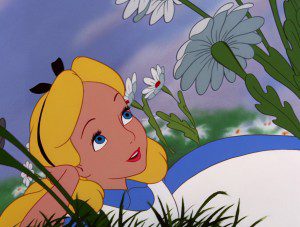 What if you could go on a drug trip with no harm? What if imagination was capable of producing better results than alcohol?
What if you could go on a drug trip with no harm? What if imagination was capable of producing better results than alcohol?
A book read more often by adults than actual children, Alice in Wonderland, was transformed into a movie that children can enjoy with grownups. Here at last the experiments with licit craziness in the War years were vindicated. This is a film of joyous sanity unleashed from the external world without slipping the boundaries of morality. This is a rare and potent power that the decadent cannot achieve and frustrates them.
When some call the colorful sequences of the film an “acid’ trip,” they are very wrong. An acid trip is a harmful, decadent way of experiencing what Disney gave us without sin. A “trip” is a Disney film with a hangover.
What is real? What is the status of fictional characters? What about ideas? Walt and company do not wrestle with these questions, they answer them. Imagination, as Santa Claus points out in Miracle on 34th Street, is a nation just like the French, English, or German nation. Alice goes to live for a time in imagination and learns that it is a necessary place to visit, but you cannot live there!
What did Walt teach me?
He vindicated imagination without going mad.
Walt was a pragmatic man, but also an imaginative man. He was no intellectual, thank God, just intellectually curious and smart. Walt’s films honor science, he was a conservative who respected the educated consensus, yet Walt also knew there was more to life than external “reality.” When people say the world of imagination is “just in my head,” they are confused. Everything I experience is “just in my head.” What people must mean is that the experiences in my head seem to have a source external to me that is (often) beyond my control. The flowers near the pond by my house do not start to dance in the twilight during my walk as much as I might will them to do so. However, I am able, often able, to have a vivid imagination of flowers doing just that very thing in a field. Whether in a dream or in my waking imagination, this experience in my head is also real to me. I have an internal life as well as an external life and both are important to human happiness. A man in external comfort who lacks any dreams is sadder than the man with some external discomfort (as my stiff muscles give me now) but a rich imagination (which Alice in Wonderland just helped feed)!
People are created in God’s own image and as JRR Tolkien pointed out, this means we must also create as He created. Of course, our creations derive from his: we imitate the mighty forms that He used to undergird the cosmos. We do nothing utterly new, merely varying the themes of nature and of Nature’s God. When Walt and company made flowers dance before our eyes, or a caterpillar smoke a hookah, or a girl grow and shrink, they did not defy reality, they created a new reality in our minds. This reality lives again every time we watch the film and has endured already longer than many more solid external realities of 1951: Alice’s golden afternoon outlived Stalin’s nightmare world.
Madness comes when a man attempts to live only in his imagination. He is not great, good, or wise enough to create a world worthy of his entire life. A man is also only a man and all the residents of his imagination are not true persons possessing a free will equal to his own. As a result, imagination is always dangerous, like Alice, one ends up seeing only oneself. That is the time to wake up.
External reality is comforting because it is God’s dream and God’s dreams are ruled by logic formed by love. Alice starts the film wishing for nonsense over sense, but flees to home when she realizes that she is too small a god to create a world where she would wish to live.
All my dreams, all of the dreams of a genius like Lewis Carroll or Walt Disney, are shadows of God’s reality. They are apt to become too dark, too cramped, too self-centered, too scary. The way of the tyrant or of the narcissistic leader is to refuse to accept the limits of our minds. The way of the dullard and the bore is to refuse to accept the could be of the imagination . . . a space where we can rest and be renewed. Some day God will come and right all the wrongs. The cosmos and even our minds will come into harmony . . .and our imaginations and the cosmos will be in tune.
What will be possible on that golden afternoon? More than even Walt could have imagined.
———-
This idea of imaginative reality was important enough to me that I wrote a book about it.











